SWEDISH
SOUTH ASIAN STUDIES NETWORK
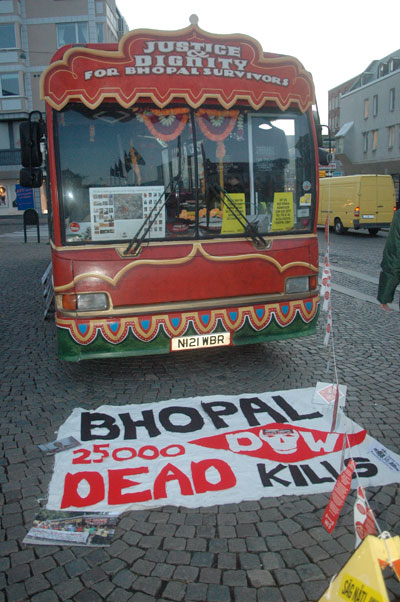 Newsletter 104:
Newsletter 104:
2 December 2009
| Educational News |
| Lectures and seminars |
| Business and Politics |
| South Asia related Culture |
| New and updated information |
• No Swedish government funding for SASNET
On Monday 30 November 2009, SASNET’s director Anna Lindberg held a crucial meeting to discuss chances of securing future funding for SASNET with officials at the Swedish Ministry of Education in Stockholm. Anna was accompanied by Dr. Ann-Katrin Bäcklund, Dean of the Faculty for Social Sciences, Lund University, and Dr. Camilla Orjuela, Division of Peace and Development Studies (PADRIGU), School of Global Studies, University of Gothenburg (and a member of SASNET’s board). They met with Katarina
Bjelke and Mattias Jennerholm from the Division of Research Policy (forskningspolitiska enheten) within the Ministry of Education.
![]() The background is that SASNET after 10 years in existence loses its main funding from the Swedish International Development Cooperation Agency, Sida, from 1 January 2010. Sida has so far contributed with two thirds of SASNET’s yearly budget of SEK 2.4 m, whereas the rest has come from Lund University. Lund University will continue with its part-funding in 2010, but is not willing to take over the full responsibility to pay for SASNET’s national networking activities. Other Swedish universities have been approached to find out their willingness to contribute financially to SASNET on a membership basis, but the response has been negative. We have also during the past year explored possibilities to secure alternate forms of grants from Sida and other funding agencies, but without any success. To a large extent, this is due to the truly multidisciplinary character of SASNET, that makes the network fall out of the framework for most funding agency programmes.
The background is that SASNET after 10 years in existence loses its main funding from the Swedish International Development Cooperation Agency, Sida, from 1 January 2010. Sida has so far contributed with two thirds of SASNET’s yearly budget of SEK 2.4 m, whereas the rest has come from Lund University. Lund University will continue with its part-funding in 2010, but is not willing to take over the full responsibility to pay for SASNET’s national networking activities. Other Swedish universities have been approached to find out their willingness to contribute financially to SASNET on a membership basis, but the response has been negative. We have also during the past year explored possibilities to secure alternate forms of grants from Sida and other funding agencies, but without any success. To a large extent, this is due to the truly multidisciplinary character of SASNET, that makes the network fall out of the framework for most funding agency programmes.
The meeting at the Ministry of Education was organised with an intent to discuss whether the Swedish government would be willing to set aside some basic funding for SASNET, in order to continue the networking activities on a national basis. However, no such promises were given. The argument given is that the users of the network, i e the Swedish universities, should pay for it themselves, and besides the Ministry could not earmark funding for national activities at one specific Swedish university.
The consequences may be that SASNET faces an acute risk that we have to close down our national activities from 1 January 2010.
• Visit by two South Asian Reference Group members
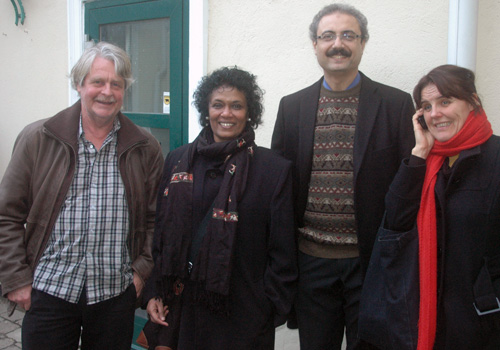 Kumudu Wijewardena and Mohsin Saeed Khan, two members of SASNET’s South Asian Reference Group visited Lund on Tuesday 24 November 2009. The purpose was to have informal discussions with Anna Lindberg and Lars Eklund about the future direction of SASNET from 2010.
Kumudu Wijewardena and Mohsin Saeed Khan, two members of SASNET’s South Asian Reference Group visited Lund on Tuesday 24 November 2009. The purpose was to have informal discussions with Anna Lindberg and Lars Eklund about the future direction of SASNET from 2010.
Both Kumudu and Mohsin have spent the recent months in Sweden. Professor Wijewardena from the Faculty of Graduate Studies, University of Sri Jayewardenepura in
Sri Lanka, has been involved in a long-standing collaborative research programme on ”Health
and Social Care for the Socially Marginalized People” with the Division of International Maternal and Child Health (IMCH) at the Dept. of Women’s
and Children’s Health, Uppsala University. This programme is now near its completion. More information.
Mohsin Saeed Khan is a Health Specialist from Islamabad, Pakistan, but also PhD Candidate in a sandwich programme with the Division of Global health
(IHCAR) at Karolinska Institutet in Stockholm. His doctoral thesis project deals with ”HIV and STI infections among Female Sex Workers
in Lahore, Pakistan”, and is in its final stage. More information.
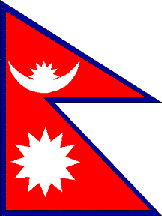 • Joint SASNET/ISDP conference on the constitution-making process in Nepal
• Joint SASNET/ISDP conference on the constitution-making process in Nepal
In May 2010, SASNET plans for a one and a half day conference at Lund University, on the constitution-making process in Nepal. The conference will be jointly organised by SASNET and the Institute for Security & Development Policy (ISDP) in Stockholm. As a preparation, SASNET’s director Anna Lindberg, and SASNET intern Nihat Ulusoy, visited ISDP on 30 November 2009. They met with the ISDP’ss director Niklas Swanström, and its deputy director Robert Nilsson.
The 2010 conference will not only discuss the constitution-making process in Nepal, but also support the Nepalese in their task by exchanging new ideas and brain storming. The background is the fact that the Constituent Assembly was endowed with drafting a new permanent constitution after the 10 April 2008 elections in Nepal. The deadline for this work is now approaching.
Participants for the forum will be invited from four Nordic countries: Finland, Sweden, Norway, and Denmark. Another 4-5 researchers from Nepal will be invited, as well as the Nepalese Ambassador to Scandinavia. More details will be presented later.
• Second SASNET conference for young Nordic scholars in August 2010
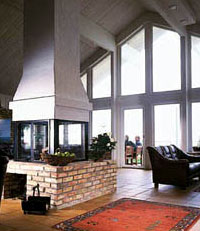 SASNET also plans to organise another Nordic multidisciplinary three-day conference on
South Asian Studies for young scholars in August 2010. This will be a follow-up to the successful conference on the same topic that SASNET arranged in Falsterbo in August 2009 (full information about this conference).
SASNET also plans to organise another Nordic multidisciplinary three-day conference on
South Asian Studies for young scholars in August 2010. This will be a follow-up to the successful conference on the same topic that SASNET arranged in Falsterbo in August 2009 (full information about this conference).
The 2010 conference will again be held at Falsterbo conference retreat (Falsterbo kursgård) in Höllviken, south of Malmö, on 18–20 August. The aim is to gather master students, doctoral students, and young post-docs in the Nordic countries (Denmark, Finland, Iceland, Norway and Sweden) who focus on South Asia in their studies or research. The conference will provide an opportunity for young scholars from all disciplines to present their future and ongoing research projects, establish contacts with colleagues in the Nordic countries, and discuss the challenges and opportunities of career planning and conducting research in South Asian Studies.
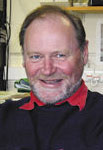 The keynote speaker will be Prof. Emeritus Graham Chapman (photo) from the Dept. of Geography, Lancaster University, UK. Other main speakers will be
Mr. Teddy Primack, Director of Academic Documents Associates, USA; Associate Professor Jan Vang, Dept. of Production, Aalborg University, Denmark; and Dr. Anna Godhe, Dept. of Marine Ecology, University of Gothenburg.
The keynote speaker will be Prof. Emeritus Graham Chapman (photo) from the Dept. of Geography, Lancaster University, UK. Other main speakers will be
Mr. Teddy Primack, Director of Academic Documents Associates, USA; Associate Professor Jan Vang, Dept. of Production, Aalborg University, Denmark; and Dr. Anna Godhe, Dept. of Marine Ecology, University of Gothenburg.
Funding has been provided by the Grace and Philip Sandblom Foundation. More details will follow. The planning for the conference is made by a working group consisting of young scholars, led by SASNET’s intern, Mr. Nihat Ulusoy, a final year student of International Relations and Ethnic Relations at Malmö University.
• Indians, Swedes and Americans most frequent visitors to SASNET’s web site
 From its inception in January 2001, SASNET’s web site has grown enormously. On the 26th November 2009, the web site consisted of a little more than 1,600 pages, and with 2,773 photos and images. Furthermore, the statistics continuosly provided to us by the web tracking company StatCounter show that the number of visitors to SASNET is steadily growing. In 2007 the number was 31,581 unique visitors, in 2008 it grew to 37,763, and for 2009 the number will most probably touch 40,000.
From its inception in January 2001, SASNET’s web site has grown enormously. On the 26th November 2009, the web site consisted of a little more than 1,600 pages, and with 2,773 photos and images. Furthermore, the statistics continuosly provided to us by the web tracking company StatCounter show that the number of visitors to SASNET is steadily growing. In 2007 the number was 31,581 unique visitors, in 2008 it grew to 37,763, and for 2009 the number will most probably touch 40,000.
Interestingly, currently most visitors come from India, Sweden and United States in this specific order, and the most popular page to visit is the one where we present South Asia related conferences all over the world. The general Research News and Nordic Researcher pages are also very popular, as well as the page where we present 250 Swedish university departments, and the one providing links to 500 South Asian research institutions worldwide, and finally the Newsletters produced by SASNET’s webmaster, Mr. Lars Eklund.
(As a final information, should be mentioned the fact that SASNET’s newsletters are currently distributed to 1,973 recipients.)
See some statistics from November 26th (as a pdf-file).
• More information about SASNET and its
activities
See SASNET’s page, http://www.sasnet.lu.se/sasnet.html
• Sida funding for four new research networks
On December 1, 2009, the Research Secretariat at the Swedish International Development Cooperation Agency (Sida) decided to grant funding to Swedish research networks with a mission to bridge the gap between researchers and development work practitioners. Four networks will be provided funding for the period 2010–2012.
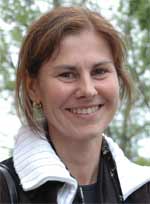 – The Gender and Development
Network (GADNET), based at the School of Global Studies, University of Gothenburg, receives SEK 500 000 to develop its sub-network entitled GADIP – Gender and Development in
Practice. Main applicant is Dr. Gunilla Blomqvist Sköldberg (photo), the GADNET coordinator.
– The Gender and Development
Network (GADNET), based at the School of Global Studies, University of Gothenburg, receives SEK 500 000 to develop its sub-network entitled GADIP – Gender and Development in
Practice. Main applicant is Dr. Gunilla Blomqvist Sköldberg (photo), the GADNET coordinator.
– The Division of Epidemiology and Public Health Sciences, Umeå University, receives SEK 1.5 m to establish VAW, the Global Network for Research Collaboration on Violence Against Women. Main applicant is Dr. Maria Emmelin.
– Stiftelsen Chalmers Industriteknik receives SEK 1.5 m to establish a network on ”Sanitation and Water Supply in Peri-Urban Areas in Developing Countries”. Main applicant is Dr. Anna Norström.
– The Research Policy Institute (FPI) at Lund University receives SEK 1.5 m to establish a network on ”Universities in Inclusive Systems of Innovation: Challenges for the 2015 Millenium Development Goals”. Main applicant is Dr. Bo Göransson.
See the list of networks supported by Sida 2009.
• Sida grants to South Asia related research projects
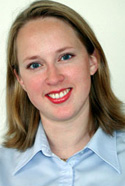 On 12 November 2009, the Swedish International Development Cooperation
Agency, Sida, decided
upon the 2009 development research grants applications. Some of the
projects that get funding for the period 2010–12
deal directly with South Asia related research.
On 12 November 2009, the Swedish International Development Cooperation
Agency, Sida, decided
upon the 2009 development research grants applications. Some of the
projects that get funding for the period 2010–12
deal directly with South Asia related research.
The recipients include Dr. Louise Olsson (photo), Dept. of Peace and Conflict Research, Uppsala University, who receives SEK 3.6 m for a project entitled ”Opportunities and Obstacles: Local Ownership of Development and Stability in Northern
Afghanistan”; and Dr. Camilla Orjuela & Dr. Jonas Lindberg, Dept. of Peace and Development Studies (PADRIGU), School of Global Studies, Gothenburg University, who receive SEK 2.8 m to develop their project on ”Corruption and Conflict: Links and Experiences in Post-War Sri Lanka”.
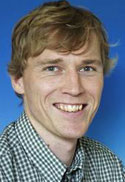 Prof. Christer Bengs & Dr. Erik Johansson (photo), Division of Housing Development and Management (HDM), Dept. of Architecture
and Built Environment, Lund University, receive SEK 1.95 m for a project entitled ”Informal settlement planning – land use, climate and energy; the cases of Guayaquil, Dar es
Salaam and Pune”.
Prof. Christer Bengs & Dr. Erik Johansson (photo), Division of Housing Development and Management (HDM), Dept. of Architecture
and Built Environment, Lund University, receive SEK 1.95 m for a project entitled ”Informal settlement planning – land use, climate and energy; the cases of Guayaquil, Dar es
Salaam and Pune”.
Other Swedish researchers with South Asia related projects that receive funding from Sida this time are Dr. Joyanto Routh, Dept. of Geology and Geochemistry, Stockholm University; Dr. Mattias Larsen, Dept. of Peace and Development Studies (PADRIGU), Gothenburg University; Prof. Birgitta Agerberth, Dept. of Medical Biochemistry and Biophysics, Karolinska Institutet; Dr. Pedro Gil, Malaria Research Unit, Department of Medicine, Karolinska Institutet; Prof. Anne-Marie Svennerholm, Dept. of Microbiology and Immunology, Institute of Biomedicine
at Sahlgrenska Academy, Gothenburg University; and Prof. Bo Mattiasson, Dept. of Biotechnology, Lund University. Go
for SASNET’s list of South Asia related projects funded
by Sida/SAREC 2009.
• Research Council grant for project on Antibiotic pollutants in waters and resistance in rural India
On 21 October 2009, Professor Cecilia
Stålsby Lundborg, Division of Global health
(IHCAR), Karolinska Institutet Medical University, Stockholm, received SEK 2 250 000 as a three-years project grant (2010–10)
from the Swedish Research Council for
research within the field of Medicine, for a project entitled ”Antibiotic pollutants in waters and resistance in rural India – Interventions to improve antibiotic resistance management”. This is a continuation of a project on antibiotics resistance that Prof. Stålsby Lundborg has conducted since 2007. More information.
• Doctoral dissertation on forest land use change in India
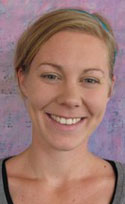 Matilda Palm, Physical geography, Department of Earth Sciences, Gothenburg University, defended her doctoral dissertation entitled ”Land Use in Climate Policy – Forest Based Options at Local Level with Cases from India” on Friday 27 November 2009. Faculty opponent was Associate Professor Emily Boyd from the School of Earth and Environment, University of Leeds, UK. The thesis tries to give an improved understanding of the local, regional and global implications of different initiatives on land use change. It was motivated by a perceived lack of local case studies exploring the contexts of climate policy. The thesis is based on fieldwork conducted mostly in the south Indian state of Karnataka, in collaboration with the Centre for Ecological Science and the Centre for Sustainable Technologies at the Indian Institute of Science (IISc) in Bangalore. More information.
Matilda Palm, Physical geography, Department of Earth Sciences, Gothenburg University, defended her doctoral dissertation entitled ”Land Use in Climate Policy – Forest Based Options at Local Level with Cases from India” on Friday 27 November 2009. Faculty opponent was Associate Professor Emily Boyd from the School of Earth and Environment, University of Leeds, UK. The thesis tries to give an improved understanding of the local, regional and global implications of different initiatives on land use change. It was motivated by a perceived lack of local case studies exploring the contexts of climate policy. The thesis is based on fieldwork conducted mostly in the south Indian state of Karnataka, in collaboration with the Centre for Ecological Science and the Centre for Sustainable Technologies at the Indian Institute of Science (IISc) in Bangalore. More information.
• Doctoral dissertation on water and agriculture in India
 Mats Lannerstad, Dept. of Water and Environmental Studies,
Tema Institute, Linköping
University, defended his doctoral dissertation entitled ”Water Realities and Development Trajectories – Global and Local Agricultural Production Dynamics” on Monday 20 April 2009. Faculty opponent was Professor Paul Appasamy from Karunya University in
Coimbatore, India. The thesis focuses on the water and agricultural production complexity in a global, regional and local perspective during different phases of development. It addresses the river basin closing process in light of consumptive water use changes, land use alterations, past and future food production in waterscarce developing countries in general, and a south Indian case study basin in particular, the Bhavani basin in Tamil Nadu. Dr. Lannerstad is now working at Stockholm Environment Institute (SEI). More information, including abstract.
Mats Lannerstad, Dept. of Water and Environmental Studies,
Tema Institute, Linköping
University, defended his doctoral dissertation entitled ”Water Realities and Development Trajectories – Global and Local Agricultural Production Dynamics” on Monday 20 April 2009. Faculty opponent was Professor Paul Appasamy from Karunya University in
Coimbatore, India. The thesis focuses on the water and agricultural production complexity in a global, regional and local perspective during different phases of development. It addresses the river basin closing process in light of consumptive water use changes, land use alterations, past and future food production in waterscarce developing countries in general, and a south Indian case study basin in particular, the Bhavani basin in Tamil Nadu. Dr. Lannerstad is now working at Stockholm Environment Institute (SEI). More information, including abstract.
• Centre for European Studies to be set up at Manipal
 In October 2009, the European Commission (EC) decided to select Manipal University in the state of Karnataka, India, to set up a Centre for European Studies, the first of its kind in India (more information). Now, Manipal University has a plan to launch a Post Graduate (PG) Diploma Programme in Gandhian & Peace Studies during the second week of February 2010. The duration of the course would be one year consisting of two semesters. International students are welcome. The broad objective of the course would be to make a modest attempt in analyzing the various Gandhian concepts and relate those concepts to the current problems and concerns of the international security environment. It would be 40 credit course, which will also have a component of 8 credits assigned to the field work conducted in Rural India either attached with some NGOs or to the ongoing rural development programmes in India. More information about the new Diploma Programme.
In October 2009, the European Commission (EC) decided to select Manipal University in the state of Karnataka, India, to set up a Centre for European Studies, the first of its kind in India (more information). Now, Manipal University has a plan to launch a Post Graduate (PG) Diploma Programme in Gandhian & Peace Studies during the second week of February 2010. The duration of the course would be one year consisting of two semesters. International students are welcome. The broad objective of the course would be to make a modest attempt in analyzing the various Gandhian concepts and relate those concepts to the current problems and concerns of the international security environment. It would be 40 credit course, which will also have a component of 8 credits assigned to the field work conducted in Rural India either attached with some NGOs or to the ongoing rural development programmes in India. More information about the new Diploma Programme.
• Oslo University fellowship for research on new media in Asia
The Dept. of Culture Studies
and Oriental Languages (IKOS), University of Oslo, announces a Doctoral Research Fellowship position within the new media in Asia and/or the Middle East.
The successful candidate is expected to study the use of new media and
communication technologies (including the Internet, satellite TV, and
mobile phones) in Asia and/or the Middle East and their impact in the
social, political, religious and/or cultural domains. The fellowship is
open to projects from a wide range of disciplinary and methodological
approaches to the study of new media. Comparative and/or multidisciplinary
projects will be considered positively. Projects grounded in fieldwork in
the region will be considered favourably. It is expected that the
candidate analyzes primarily data in one or several of the region's
languages. Candidates must therefore demonstrate advanced active skills in
at least one relevant Asian and/or Middle Eastern language.
• More information about South Asia related
research at Swedish and Nordic universities
See SASNET’s page, http://www.sasnet.lu.se/research.html
• Stockholm University launches Internet Hindi II course
The Division of South and Central Asian Studies (Section for Indology) at the Department of
Oriental Languages started an entirely new 30 ECTS credits Hindi course in the Fall 2009. The course is based on Internet distance learning, and has attracted 70 students. The teachers are Roberto Menkes and Mirja Juntunen.
The Faculty has now approved the continuation of the course, Internet Hindi II, another 30 credits course that will start in January 2010. Students who meet the requirements are welcome to apply by e-mail to exp@orient.su.se before January 24, 2010. More information.
• Sustainable Urban Water and Sanitation training programme at Lund University
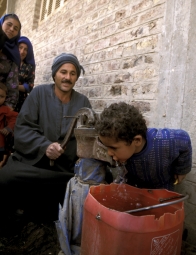 Lund University Education – the university's company for
commissioned education – offers a number of English-language
educational training programmes funded by the Swedish International
Development Cooperation Agency, Sida, to be held in
the Fall 2010 – Spring 2011.
Lund University Education – the university's company for
commissioned education – offers a number of English-language
educational training programmes funded by the Swedish International
Development Cooperation Agency, Sida, to be held in
the Fall 2010 – Spring 2011.
–
The advanced International training programme on ”Sustainable
Urban Water and Sanitation” will run again with a 19 days course in Lund in August/September 2010, and with a regional seminar in one of the participating countries in February/March 2011. The overall objective
of the programme is to provide the participants with understanding
and knowledge about the need for integrated approaches and the
organisational and institutional changes that are necessary for
a sustainable provision of water supply and sanitation services
in urban areas. From
South Asia, professionals in the field from Bangladesh, India
and Sri Lanka are welcome to apply for this programme. The programme
is managed by staff from the Dept. of
Water Resources Engineering. Closing date for applications:
3 March 2010. More
information.
• Information about South Asia related
education at Swedish and Nordic universities
See SASNET’s page, http://www.sasnet.lu.se/education.html
• Copenhagen Climate Challenge Conference
Professor Nils-Axel Mörner, former Head of the Paleogeophysics and Geodynamics Unit,
Stockholm University, participates in the Copenhagen Climate Challenge Conference, to be held in Copenhagen 8–9 December 2009. Prof. Mörner is an expert on world sea levels and has conducted an exhaustive study of sea level changes in the
Maldives, and also in Bangladesh where his research
produced some surprising results. The conference, organised by the organisation Climate-Sense, coincides with the official UN Climate Change Conference (COP15) that is taking place in Copenhagen from 7-18 December 2009. More information.
• Gothenburg workshop on Business in Asia
A workshop on ”Business in Asia:
A Global Shift in the Knowledge Economy” will be held at the University of Gothenburg, 9–10 December 2009. It is jointly hosted by the Institute of Innovation and Entrepreneurship (IIE), School of Business, Economics and Law, University of Gothenburg, and the Institute for Management of Innovation and Technology (IMIT) in Gotheburg – a national Swedish institution established in 1979 through co-operation between the Swedish Institute of Management (IFL), Chalmers University of Technology, Stockholm School of Economics, Royal Institute of Technology (KTH), and Lund University. The themes for the conference are: • Asia – Growing economic powers and a new engine for knowledge and technology‚ • Global structural transformation; and • Changing conditions for innovation – local, national and global adaptation and repositioning.
Some of the presentations focus specifivcally on India. Sharmistha Bagchi-Sen will talk about ”Internationalization of Indian Pharmaceuticals”; Kavita Mehra and Nitu Singh on the ”Emergence of India as a Global Player in Biotechnology Sector”; and Rishi Kochhar & Poonam Arora Siddhant Srivastava on ”Information Technology – New Engine of Knowledge in India: A Case for Financial Sector Growth”. Registration closed on 1 December 2009. More information.
• Uppsala conference on contested civil society
 An International conference entitled ”Power to the People?
(Con-) Tested Civil Society in Search of Democracy” will be held in Uppsala 23–24 March 2010. It is organized by the Uppsala Centre for Sustainable Development (CSD) at Uppsala University,
in cooperation with the Swedish International Development Cooperation Agency (Sida) and its Team Civil Society. The conference will try to explore differences of civil society formation across the world. Key lectures will be given by top scholars from four continents, among them Prof. Nandini Sundar, Dept. of Sociology, Delhi School of Economics, Delhi University. A series of participatory parallel sessions will also be held, a few of them focusing on South Asia.
An International conference entitled ”Power to the People?
(Con-) Tested Civil Society in Search of Democracy” will be held in Uppsala 23–24 March 2010. It is organized by the Uppsala Centre for Sustainable Development (CSD) at Uppsala University,
in cooperation with the Swedish International Development Cooperation Agency (Sida) and its Team Civil Society. The conference will try to explore differences of civil society formation across the world. Key lectures will be given by top scholars from four continents, among them Prof. Nandini Sundar, Dept. of Sociology, Delhi School of Economics, Delhi University. A series of participatory parallel sessions will also be held, a few of them focusing on South Asia.
Session 1 on ”Uncivil attachments: The role of ethnic affiliations, kinship bonds and patron-client relations in contemporary popular politics” is chaired by Dr. Beppe Karlsson, Dept. of Cultural Anthropology and Ethnology, Uppsala University;
Session 2 on ”Gendered participation in civil society: ‘New’ spaces for women or a less powerful road? What kind of space and what kind of power?” is chaired by Dr. Monica Erwer, The Swallows India Bangladesh/School of Global Studies,
University of Gothenburg;
Session 3 on ”Contradictory interests within civil society: Open conflicts and new state-civil society relations” is chaired by Dr. Henrik Berglund, Dept. of Political Science, Stockholm University; and
Session 7 on ”Religious discourses as a part of civil society formation and democratization in Asia” is chaired by Dr. Ann Kull, Centre for East and Southeast Asian Studies (ACE), Lund University.
Deadline for submission of abstracts is 25 January 2010. Venue: Missionskyrkan, S: Olofsgatan 40, Uppsala. More information.
• MIT workshop on Challenges to Secularism and Rule
of Law in India
A workshop on ”Group Violence, Terrorism and impunity: Challenges to Secularism and Rule
of Law in India” will be held at the Massachusetts Institute of Technology (MIT) in Cambridge, Massachusetts, USA, 9–10 April 2010. It is sponsored by the Program in Human Rights and Justice at MIT’s Center for
International Studies. India has
had a history of violence based on religious and cultural differences
since the colonial period culminating in the Partition violence of 1947.
The workshop seeks to explore how and why such violence continues, or is
different in the postcolonial period. It will also critically engage with the relationship between
group violence and the rule of law. In doing so, it seeks to put to test
the many definitions of 'secularism' and examine the role of the Indian
state in perpetuating group violence. Prof. Paul Brass, University of Washington will give the keynote address. A final program will be announced in January 2010. More information.
• International Teyyam Workshop in Kannur
 An International Teyyam Workshop will be held in Kannur, Kerala, India, 18–24 April 2010. The week-long workshop is hosted by the Folklore Fellows of Malabar (Trust). Teyyam is a part of the native religion of North Kerala, consisting of
various ritual performances, myths, drumming, dance forms, and
distinctive facial make-up, headgear, and costumes. It is found in
numerous variants in communities throughout North Kerala. This workshop will introduce Teyyam to scholars and those interested in
native/local culture. It will include Teyyam performances in their
natural context, discussions, lectures by eminent teyyam scholars, and
tours to important teyyam shrines. Deadline for registration is 15 December 2009. More information.
An International Teyyam Workshop will be held in Kannur, Kerala, India, 18–24 April 2010. The week-long workshop is hosted by the Folklore Fellows of Malabar (Trust). Teyyam is a part of the native religion of North Kerala, consisting of
various ritual performances, myths, drumming, dance forms, and
distinctive facial make-up, headgear, and costumes. It is found in
numerous variants in communities throughout North Kerala. This workshop will introduce Teyyam to scholars and those interested in
native/local culture. It will include Teyyam performances in their
natural context, discussions, lectures by eminent teyyam scholars, and
tours to important teyyam shrines. Deadline for registration is 15 December 2009. More information.
• Hofstra conference on the Hermeneutics of Sikh Music
The First Conference on ”The Hermeneutics of Sikh Music (raag) and Word (shabad)” will be held at Hofstra University in Hempstead, New York State, USA, 21–23 May 2010. The purpose of this conference, organised by the university’s Sikh Studies Program, is to bring these two crucial dimensions of Sikh thought and practice, philosophy and aesthetics, together to initiate an academic dialogue between the Word (language, meaning, interpretation) and its performance in Music and Song (raag/melody, taal/metric cycle, laya/tempo, bhaav/expression, instruments etc). Papers should be submitted before 1 March 2010. More information.
• International Epidemiological Association meeting in Colombo
The 10th South Asia Regional Scientific Meeting of the International Epidemiological Association will be held in Colombo, Sri Lanka 23–26 May 2010. The theme of the conference is “Epidemiological Methods in Evidence Based Healthcare”. It will consist of key note addresses, plenary lectures, symposia, pre-conference sessions and oral and poster presentations on a variety of topics. Scholarships will be awarded based on a selection process which will be closely tied to the abstract submission process. The scholarship application opens on 15th December 2009. Deadline for submitting abstracts is 15 February 2010. Venue: Public Health Complex, Elvitigala Mawatha, Narahenpita, Sri Lanka. More information.
• 26th Sanskrit Tradition in the Modern World seminar
The 26th annual meeting of the Sanskrit Tradition in the Modern World, STIMW, seminar will be organised in Machester, UK, on Friday 28 May 2009. Three years ago, STIMW moved to Manchester (previously the STIMW seminars were held at Minsteracres Retreat Centre, a monastery in the Tyne valley near to Newcastle), to continue to offer a forum for the discussion of papers on varied aspects of Indian religions. Paper proposals should be submitted by 11 December 2009. More information.
• Bratislava conference on Maharashtrian Culture and Society
The Thirteenth International Conference on Maharashtra: Culture and Society will be held in Bratislava, Slovak Republic, 17–19 June 2010. It is organized by the Dept. of Ethnology and World Studies at the University of Saints Cyril and Methodius in Trnava, Slovak Republic. The theme of the conference will be ”Environments”, challenging researchers working on Maharashtrian culture and society to concentrate on what surrounds those many little/great things/people/processes etc. that they meet
while carrying out research work. Abstracts should be submitted before 15 January 2010. More information.
• Singapore conference on the ‘Chindia’ Challenge to Global Communication
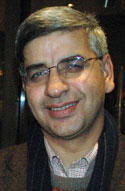 As a preconference to the International Communication Association Conference (ICA 2010) that will be held in Singapore 22–26 June 2010, a one day-conference on ”The ‘Chindia’ Challenge to Global Communication” will be arranged on Tuesday 22 June 2010. It is conceived and organized by Prof.
Daya Thussu, Director of India Media Centre at the University of Westminster, London. The pre-conference is supported by the
Mass Communication Division of the ICA, and by the Center for Global Communication Studies, Annenberg School for Communication, University of Pennsylvania, USA. The focus will be on the transformation of communication and media in China and India – the world’s two most populous countries and fastest growing economies, and its profound implications for what constitutes the ‘global’. Abstracts should be submitted before 7 December 2009. More information.
As a preconference to the International Communication Association Conference (ICA 2010) that will be held in Singapore 22–26 June 2010, a one day-conference on ”The ‘Chindia’ Challenge to Global Communication” will be arranged on Tuesday 22 June 2010. It is conceived and organized by Prof.
Daya Thussu, Director of India Media Centre at the University of Westminster, London. The pre-conference is supported by the
Mass Communication Division of the ICA, and by the Center for Global Communication Studies, Annenberg School for Communication, University of Pennsylvania, USA. The focus will be on the transformation of communication and media in China and India – the world’s two most populous countries and fastest growing economies, and its profound implications for what constitutes the ‘global’. Abstracts should be submitted before 7 December 2009. More information.
• Göttingen workshop on Space, Capital and Social History in South Asia
An international workshop on ”Space, Capital and Social History in South Asia” will be held at the University of Göttingen, Germany, 24–26 June 2010. It is organised by the Dept. of History at the university’s newly founded Centre for Modern Indian Studies. Papers are invited from historians and social scientists on issues such as, – sthe de-industrialisation of formerly celebrated ‘Manchesters of the East’ like Ahmedabad and the gentrification of workers’ neighbourhoods like Mumbai’s vast ‘factory village’ Girangaon; – the relocation of industries and the rapid production of new, transnationally connected landscapes of capital (like that of Gurgaon) brought to life by both ‘informally’ and ‘formally’ employed work forces; – violent conflicts over land for capital-induced ‘Special Economic Zones’ or schemes of infrastructural ‘development’; and – the seemingly irresistible rise of the corporate ‘developer’ and the dynamics of spatial segregation in India’s metropolitan cities. Proposals for papers should be submitted before 8 January 2010. More information.
• London conference on South Asians Making Britain, 1870-1950
A conference entitled ”Bharat Britain: South Asians Making Britain, 1870-1950” will be held in London 13–14 September 2010. The conference, held in partnership with the British Library, forms part of a large research project entitled ”Making Britain”. This is a collaborative interdisciplinary venture over three years, examining the formative South Asian contribution to Britain’s literary, political and cultural life in the period 1870–1950. The project is funded by the British Arts and Humanities Council, and carried out by researchers at King’s College, London, University of Oxford, and The Open University. Invited plenary speakers include Humayun Ansari, Santanu Das, Chandani Lokugé, Nayantara Sahgal, and Amartya Sen. Venue: British Library Conference Centre, St Pancras, London, UK. Deadline for submitting abstracts is 18 January 2010. More information.
• Other conferences connected to South Asian
studies arranged all over the World
See SASNET’s page, http://www.sasnet.lu.se/conferences.html#conf
Important lectures and seminars in Scandinavia
• Stockholm seminar on Energy Challenges in India
 A seminar on India – Energy Challenges in a Growth Region (Indien – energiutmaningar i en tillväxtregion) was held in Stockholm today, Wednesday 2 December 2009, 13.00–16.30. The seminar was organised by Network Oil and Gas (NOG), a networking initiative by the Swedish Energy Agency, and hosted by Ångpanneföreningen (ÅF). NOG was created in 2001 with an aim to provide a foundation for a wide debate in energy politics by putting focus on the importance of oil and gas for vital functions in the society. The speakers include Ingolf Kiesow, former Ambassador, and now researcher at the Institute for Security and Development Policy (ISDP) in Stockholm; and Dr. Ponugoti Wenkateswar Rao, Director for the Centre for Indian Ocean Studies at Osmania University in Hyderabad, India. Venue: ÅF Division Energy, Frösundaleden 2 A, Stockholm. Full information (in Swedish only).
A seminar on India – Energy Challenges in a Growth Region (Indien – energiutmaningar i en tillväxtregion) was held in Stockholm today, Wednesday 2 December 2009, 13.00–16.30. The seminar was organised by Network Oil and Gas (NOG), a networking initiative by the Swedish Energy Agency, and hosted by Ångpanneföreningen (ÅF). NOG was created in 2001 with an aim to provide a foundation for a wide debate in energy politics by putting focus on the importance of oil and gas for vital functions in the society. The speakers include Ingolf Kiesow, former Ambassador, and now researcher at the Institute for Security and Development Policy (ISDP) in Stockholm; and Dr. Ponugoti Wenkateswar Rao, Director for the Centre for Indian Ocean Studies at Osmania University in Hyderabad, India. Venue: ÅF Division Energy, Frösundaleden 2 A, Stockholm. Full information (in Swedish only).
• Stockholm seminar on Water as a source to conflicts and collaboration
Arenagruppen in Stockholm organises a seminar on Water as a source to conflicts and collaboration (”Vatten som källa till konflikter och samarbeten”) on Wednesday 2 December 2009, at 18.00. The invited speakers are Staffan Landin from Gapminder; Peter Haldén, researcher at Helsinki University, previously affiliated to Swedish Defence Research Agency (FOI); Johan Schaar, Head of the Department of Environment, Climate Change and Sustainable Services at the Swedish International Development Cooperation Agency, Sida, and also Head of the Secretariat of the International Commission on Climate Change and Development; and Karin Lexén, Project Director, Swedish Water House. Venue: Södra Teatern, Mosebacke torg 1-3, Stockholm. More information.
• Copenhagen seminar on Climate Change – Perspectives on Asia
 An interdisciplinary seminar on ”Climate Change – Perspectives on Asia” will be arranged in Copenhagen on Tuesday 8 December 2009, 14.00–17.00. It is jointly organized by the Asian Dynamics Initiative (ADI) and the Nordic Institute of Asian Studies (NIAS) at University of Copenhagen, and is held in connection with the UN Climate Change Conference (COP15) that is taking place in Copenhagen from 7-18 December 2009. One of the presentations will be given by Frida Hastrup (photo), a post-doc from the Dept. of Anthropology, University of Copenhagen. She will speak about ”On Wind and Weather. Climate Change and Local Theory Making in South India”. Dr. Hastrup defended her doctoral dissertation entitled 'Weathering the World – Recovery in the Wake of the Tsunami in a Tamil Fishing Village' in June 2009. Venue for the seminar: NIAS, Leifsgade 33, 3rd floor, Copenhagen. More information.
An interdisciplinary seminar on ”Climate Change – Perspectives on Asia” will be arranged in Copenhagen on Tuesday 8 December 2009, 14.00–17.00. It is jointly organized by the Asian Dynamics Initiative (ADI) and the Nordic Institute of Asian Studies (NIAS) at University of Copenhagen, and is held in connection with the UN Climate Change Conference (COP15) that is taking place in Copenhagen from 7-18 December 2009. One of the presentations will be given by Frida Hastrup (photo), a post-doc from the Dept. of Anthropology, University of Copenhagen. She will speak about ”On Wind and Weather. Climate Change and Local Theory Making in South India”. Dr. Hastrup defended her doctoral dissertation entitled 'Weathering the World – Recovery in the Wake of the Tsunami in a Tamil Fishing Village' in June 2009. Venue for the seminar: NIAS, Leifsgade 33, 3rd floor, Copenhagen. More information.
• Lund seminar on Climate Changes from a Bangladeshi Perspective
An open seminar on ”Climate Changes, Climate Equity and Human Adaptability Strategies from a Bangladeshi Perspective” will be held in Lund on Thursday 10 December 2009, 18.00–20.00. Sukanta Sen from the Bangladesh Resource Centre for Indigenous
Knowledge (BARCIK) has been invited the Swallows India Bangladesh to speak about the research carried out by BARCIK on integrating local expertise in all developmental work. Venue: Svalorna,
Spolegatan 5, Lund. More information.
• Lund University invites to theme day on Indic religions
The Centre for Theology and Religious Studies (CTR),
Lund University, organises a day devoted to the theme of Indic Religions, on Friday 11 December 2009, 10–17. It includes a guest lecture on ”Religion and Politics in South Asia” by Torkel Brekke, University of Oslo. Researchers focusing on Indic religions at CTR will then present themselves and their research. Prof. Olle Qvarnström, History of Religion, will talk about his work to translate old Sanskrit documents, as well as document and interpret Jaina cave paintings from the 9th Century. Prof. Antoon Geels, Psychology of Religion, will show photos and a film from a recent visit to Bhutan. Finally, a seminar is held where Lund University students are invited to meet PhD candidates and young researchers affiliated to CTR. All are welcome, but please note that the lectures will be in held in Scandinavian language. Venue: CTR, Allhelgona Kyrkogata 8, Lund. More information.
• Uppsala seminar on Health and Social Care for the Socially Marginalized People
A seminar to share experiences from the Swedish-Srilankan collaborative research programme on “Health and Social Care for the Socially Marginalized People” will be held in Uppsala on Wednesday 16 December 2009, 9.00–13.00. Since 2003, the Division of International Maternal and Child Health (IMCH) at the Dept. of Women’s and Children’s Health, Uppsala University, has been involved in this programme with the Dept. of Community Medicine, University of Sri Jayewardenepura, Sri Lanka. It has been funded by Sida/SAREC, and has resulted in a number of conferences and PhD thesis projects over the years. During the Uppsala seminar, presentations will be given by the coordinators Prof. Kumudu Wijewardena and Prof. Gunilla Lindmark, but also from several of the researchers involved in the research programme, e g Pia Axemo, Tord Naessén, Pia Olsson and Aida Aragao Lagergren. Venue: Eklundshof, Eklundshofsvägen 7, Uppsala.
More information.
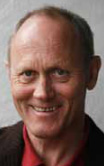 • Tor Aase lectures on the grammar of Honour and Revenge
• Tor Aase lectures on the grammar of Honour and Revenge
Professor Tor H Aase Professor from the Dept. of Geography, University of Bergen, holds a guest lecture at the Nordic Institute of Asian Studies (NIAS) in Copenhagen on Thursday 28 January 2010, 14.00–15.30. Prof. Aase will talk about ”The grammar of Honour and Revenge”, dealing with the various cultural expressions of honour and revenge, based on an analysis of a prototypical feuding community in Northern Pakistan. He also discusses the search for a basic 'grammar' that can explain why honour becomes a valid theme in some societies and in some situations. In that endeavor, two questions are vital: What is honour all about? And what is the logic in the notion that lost honour can be restored through revenge? More information.
Business and Politics
• Information about South Asia related business and politics in Sweden
See SASNET's page, http://www.sasnet.lu.se/polbuss.html
South Asia related culture in Scandinavia
• Subcontinental modernist artists on display at Lunds Konsthall
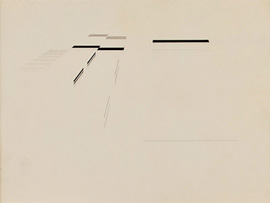 Three simultaneous exhibitions presenting Indian subcontinental artists are on display at Lunds konsthall during the period 28 November 2009 – 24 January 2010. One exhibition features
works by Nasreen Mohamedi (1937–90), regarded as one of the most important Indian artists of her generation, now being recognised as a key body of work within the modernist canon (one of her untitled paintings shown here).
Three simultaneous exhibitions presenting Indian subcontinental artists are on display at Lunds konsthall during the period 28 November 2009 – 24 January 2010. One exhibition features
works by Nasreen Mohamedi (1937–90), regarded as one of the most important Indian artists of her generation, now being recognised as a key body of work within the modernist canon (one of her untitled paintings shown here).
The second exhibition, entitled ”Structures, Chakras, Triangles”, features works by
Rasheed Araeen, born 1935 in Karachi, now Pakistan, also incidentally the birthplace of Nasreen Mohamedi. The final exhibition, entitled ”Steps Away from Oblivion” has been put together by the
Raqs Media Collective, and consists of a circuit of films, installed on screens and as projections in a confined space, that invoke different rhythms of repose and transformation in today’s India.
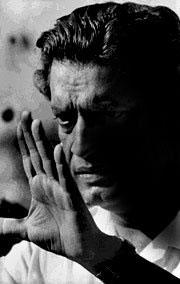 The Raqs Media Collective, a group of internationally active artists and curators (Jeebesh Bagchi, Monica Narula, Shuddhabrata Sengupta) based in Delhi, have invited eight documentary filmmakers (Debkamal Ganguly, Ruchir Joshi, Kavita Pai & Hansa Thapliyal, M.R. Rajan, Priya Sen, Surabhi Sharma, Vipin Vijay) to rework key sequences in their earlier films.
The Raqs Media Collective, a group of internationally active artists and curators (Jeebesh Bagchi, Monica Narula, Shuddhabrata Sengupta) based in Delhi, have invited eight documentary filmmakers (Debkamal Ganguly, Ruchir Joshi, Kavita Pai & Hansa Thapliyal, M.R. Rajan, Priya Sen, Surabhi Sharma, Vipin Vijay) to rework key sequences in their earlier films.
Besides the art exhibitions, there will also be a retrospective showing of seven classic films by the celebrated Bengali director Satyajit Ray (1921–91, photo to the left), also famous as a writer, film critic, illustrator, graphic designer and publisher.
This will be organised in collaboration with the Kino Cinema Theatre in Lund.
More information about the art exhibitions and film shows in Lund.
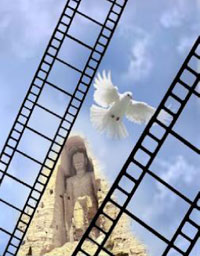 • First-ever Afghani film festival – in Nacka
• First-ever Afghani film festival – in Nacka
For the first time ever, an all-Afghani film festival will be held 5–7 December 2009 at Dieselverkstaden in Nacka, Sweden. The festival is organised by the Afghani Pen Club, in collaboration with the Swedish Committee for Afghanistan and Nacka municipality. Several of the more than 20 films that will be shown, both documentaries and movies, have won prestigeous international prizes. Among the films could be mentioned ”Jange Taryak” (Opiumkriget) by Siddiq Barmak, ”lezzat o Shaowqh” (Önskning och Njutning) by Qader Aryaei, and ”Man Asp mekhaham na Zann” (Jag vill ha en häst och ingen fru) by Homayun Payiz. The festival also includes a photo exhibition by Farid Arwand, and an art exhibition by Rahim Ghafoori. Venue: Dieselverkstaden, Marcusplatsen 17, Nacka.
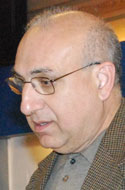 • Iqbal Day celebrated in Taastrup
• Iqbal Day celebrated in Taastrup
As ususal, the Iqbal Academy Scandinavia (IAS) based in Denmark, observed Iqbal Day at Taastrup in Copenhagen, Denmark on 15 November 2009. The guest of honour was Professor Mustansir Mir (photo), Director of
the Centre of Islamic Studies at the Dept. of Philosophy and Religious Studies,
Youngstown State University, Ohio, USA. He delivered a speech on “The Qur’an
in Iqbal’s poetry”. More information.
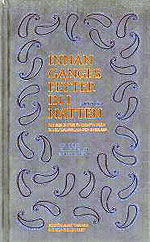 • Release party for anthology of Indian poems translated into Swedish
• Release party for anthology of Indian poems translated into Swedish
A literary release party for a new anthology of Indian poems translated into Swedish will be held in Stockholm on Wednesday 9 December 2009, 19–22. The volume, entitled ”Innan Ganges flyter in i natten” has been edited by Tomas Löfström and Birgitta Wallin, and is the latest in a row of Indian books translated into Swedish within the framework of the Indian Library project (more information). The new book has been published by Tranan publishing house, and consists of poems by approximately 50 Indian poets writing in Hindi, Malayalam or English. Among them are Shamsher Bahadur Singh, Ayyappa Paniker, Kamala Das, K. Satchidanandan, Sujata Bhatt, Teji Grover, Anita Thampi, Ranjit Hoskote and Anjum Hasan. The translations into Swedish have been made by 12 Swedish translators. Venue for the release party:
Ateljé Ciresia, Mariatorget 1 C, Stockholm. Register your participation before 7 December. More information.
• Bollywood cinema in Malmö celebrates first anniversary
 Recently Biocentrum, the Bollywood cinema in Malmö/Limhamn – the only one of its kind in Sweden – celebrated its first anniversary. The historic cinema hall from 1916, formerly called Centrumbiografen, was converted into a Bollywood cinema in November 2008. It now has a flourishing business with film shows (mostly Bollywood), concerts and other events, and a Bollywood dance school led by the choreographer Neelam Bertelsen. Biocentrum is located at Järnvägsgatan 28 in Limhamn.
Recently Biocentrum, the Bollywood cinema in Malmö/Limhamn – the only one of its kind in Sweden – celebrated its first anniversary. The historic cinema hall from 1916, formerly called Centrumbiografen, was converted into a Bollywood cinema in November 2008. It now has a flourishing business with film shows (mostly Bollywood), concerts and other events, and a Bollywood dance school led by the choreographer Neelam Bertelsen. Biocentrum is located at Järnvägsgatan 28 in Limhamn.
More information at Biocentrum’s new web page.
• More information about South Asia related culture
in Sweden and Scandinavia
See SASNET’s page, http://www.sasnet.lu.se/culture.html
New and updated items on SASNET web site
• Swedish departments where research on
South Asia is going on:
Constantly added to the list of research environments at Swedish
universities, presented by SASNET. The full list now includes 260 departments,
with detailed descriptions of the South Asia related research and education
taking place! Go to http://www.sasnet.lu.se/environment.html
‡ Division of Physiological Chemistry I, Department of Medical Biochemistry and Biophysics (MBB), Karolinska Institutet Medical University, Stockholm
‡ School of Social Work, Lund University
• Useful travelling information
Look at http://www.sasnet.lu.se/travelling.html.
Updated travel advises from the The British Foreign & Commonwealth
Office about safety aspects on travelling to the countries of
South Asia.
Best regards,
Lars Eklund
deputy director/webmaster
SASNET/Swedish South Asian Studies Network
SASNET is a national network for research, education, and information about South Asia based at Lund University. Its aim is to promote a dynamic networking process in which Swedish researchers co-operate with researchers in South Asia and globally.
The SASNET network is open to all the sciences. Priority is given to interdisciplinary cooperation across faculties, and more particularly to institutions in the Nordic countries and South Asia. SASNET believes that South Asian studies will be most fruitfully pursued as a cooperative endeavour between researchers in different institutions who have a solid base in their mother disciplines.
The network is financed by Sida (Swedish
International Development Cooperation Agency) and by Lund
University.
Postal address: SASNET – Swedish South Asian Studies Network,
Scheelevägen 15 D, SE-223 70 Lund, Sweden
Visiting address: Ideon Research Park, House Alpha 1 (first floor,
room no. 2040), in the premises of the Centre for East and South
East Asian Studies at Lund University (ACE).
Phone: + 46 46 222 73 40
Fax: + 46 46 222 30 41
E-mail: sasnet@sasnet.lu.se
Web site:
http://www.sasnet.lu.se
SASNET - Swedish South Asian Studies Network/Lund
University
Address: Scheelevägen 15 D, SE-223 70 Lund, Sweden
Phone: +46 46 222 73 40
Webmaster: Lars Eklund
Last updated
2011-04-08